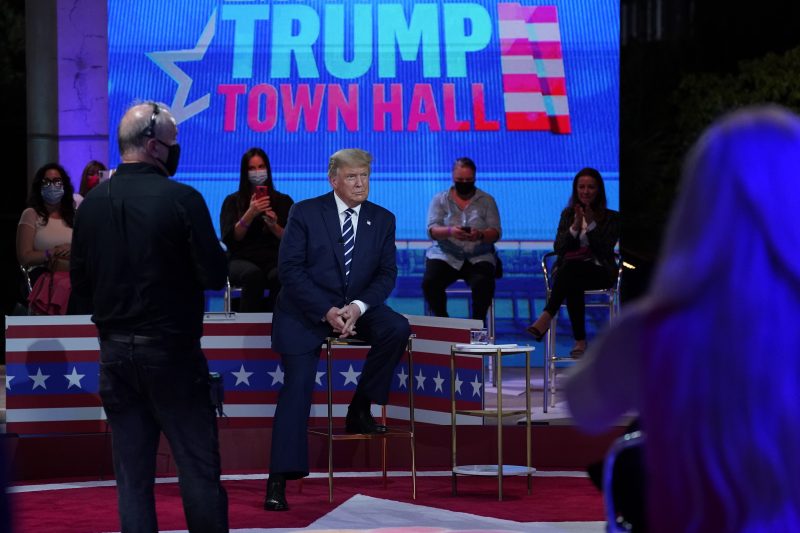All politicians are salesmen, to some extent. The job is ostensibly focused on creating legislation but functionally dependent upon being able to convince people you’re the best person for the job — meaning that salespeople have an advantage over wonks in being in the room to craft policy.
In recent years, the demonstrated balance between those two traits in those seeking office has increasingly tilted to the former: Candidates are often salespeople for culture war rhetoric who get to Washington and are indifferent about the intricacies of what they’re voting on. Former North Carolina congressman Madison Cawthorn (R) infamously informed his colleagues upon his arrival that he had “built my staff around comms rather than legislation.”
The most prominent example of this phenomenon, of course, is the most recent Republican president. Donald Trump not only prioritized salesmanship over policy, but he spent decades as a salesman and approximately zero minutes considering policy before throwing his hat into ring to serve as president. And then, because he was good at the sales part of it, he got elected president.
Now, it is not my goal to cast aspersions here or to paint with too broad a brush, but it is the case that salespeople are not generally understood to be the most honest participants in our cultural conversations. They want you to provide something of value to them, and they will do what they can to convince you this transaction makes sense. This can inculcate a tendency to shade the truth a bit, or to withhold salient information.
Trump was not a standard-issue salesman. He was a guy who sold real estate in New York City, which is the major leagues of real estate hustling. He was also a guy who managed to convince more than one bank that despite his spotty business record, he could be trusted with massive loans — loans that are now part of a fraud investigation by the New York attorney general.
There was little question that Trump’s assertions weren’t reliable or even consistent when he was on the campaign trail and in office. He very quickly established a reputation for saying false things, failing to correct those false things and pitching his base on the idea that the fake assertions were true and that the people who were saying they weren’t true were themselves fake news. The Washington Post tallied more than 30,000 false or misleading claims during the five-plus years he was running for and serving as president, most repeats of things he had said previously. He didn’t care, and neither did his base.
Because the political media was used to politicians who were only part-time salespeople and otherwise invested in retaining some credibility, Trump’s entry into the 2015 campaign was covered as something of a novelty. First of all, it didn’t seem like he was going to win, but then he was just saying this outrageous nonsense. Reporters would air it all, live, and then panels would come on to marvel about and pick apart his claims.
It was as though ESPN’s NASCAR team had shown up to a monster-truck rally. This guy’s not driving in a big oval! He’s not going very fast! And most amazingly, he’s just crushing all the other cars! What’s he even thinking! And the answer was: He was thinking that people wanted to watch a monster-truck rally. And they were right.
By mid-July 2015, a month after Trump announced his candidacy, he took the lead in primary polling. Even this was seen as an aberration, a surge to the front that mirrored other, short-lived surges to the front in past primaries. But what had occurred was that Trump’s embrace of a monster-truck, destroy-it-all approach synced with what right-wing Republicans were hearing in conservative media. Trump’s sales pitch on things such as the dangers of immigrants was keenly attuned to what the marketplace sought. And while challengers such as former Florida governor Jeb Bush were unwilling to cross certain lines in making their own sales pitches, Trump had no such qualms. And all of it got media coverage, often live.
In the primary, it is estimated that Trump was the beneficiary of the equivalent of $1.9 billion in earned media, nearly $2 billion of attention that derived from his ability to get people to pay attention to what he was saying. By the end of the general election, that had increased to $5 billion.
This was not an unqualified boon to Trump, certainly. Americans very quickly formed strong opinions about him, often sharply negative ones (from Democrats). But it did mean the injection of a great deal of toxic nonsense into the public discourse. Trump’s ability to make claims directly to the public over social media and in televised interviews — generally with sycophantic outlets and interviewers, by the end of his term in office — contributed to the false belief that the 2020 election was stolen. And that belief drove the riot at the Capitol.
It is now nearly eight years since Trump first announced his candidacy for president. Over the course of this three-quarters of a decade, we can make two statements with confidence.
First, that Trump will invariably make false or misleading claims when given an opportunity to do so.
Second, that those false claims can amplify distrust and hostility to groups of people or institutions, including the government, in ways that can be dangerous.
Which brings us to CNN.
On Monday, the news channel announced that it would host a “town hall” with Trump to air next week. In a news release, CNN stated that the event, hosted by anchor Kaitlan Collins, would have Trump “take questions from Collins and a live audience of New Hampshire Republican and undeclared voters.” A request for more details about the process from the network did not yield more information.
The safe assumption, then, is that this “town hall” will unfold as most do: with Trump taking questions from Collins and the audience, and his answers carried live to the viewing public. And if that is the case, it is safe to assume that the event will fall into the same category as so much of the pre-2016 coverage: providing a forum for salesman Trump to misinform and mislead viewers to make himself as palatable as possible. In other words, it will not inform CNN’s audience. Quite the opposite.
In 2020, CNN’s excellent fact-checker, Daniel Dale, outlined how journalists could conduct more effective interviews of Trump. In short, he said, it was important for journalists to offer simple requests for additional information — who said that? When was it said? — as a way to expose his falsehoods. He even used an exchange between Trump and Collins at the White House as an example of how challenging this could be, given Trump’s squirminess and willingness to redirect.
I wrote about this in 2019, showing step-by-step how an effort to pin Trump down on misleading data was derailed by the then-president’s well-honed ability to trip up questioners. I used CNN’s Jim Acosta as an example (as did Dale), showing how Acosta’s use of a multipart question made it easier for Trump to pick out a path forward. Sure, as Dale noted, Jonathan Swan (then of Axios) and Chris Wallace (then of Fox News) could push back on Trump in one-on-one interviews that were taped and edited. But outside of those constraints?
Now introduce average Americans given the chance to ask Trump questions. A guy from New Hampshire stands up and asks Trump about the federal investigation into his removal of documents from the White House, for example. Trump begins a stemwinder about political targeting from the Justice Department and President Biden having documents and all of the standard deflections. That New Hampshirite isn’t going to push back with simple requests meant to expose Trump’s falsehoods. Will CNN? How? On all of them?
Even if they wanted to, a live broadcast has an unalterable constraint: time. Swan and Wallace could challenge Trump for an hour and cut the interview down to the necessary runtime. Collins and CNN can’t. Trump can easily throw out more nonsense than CNN has time to fact-check, even if it intended to.
So what’s the value? It’s good to get Trump on-record on issues, particularly from a news outlet such as CNN that is going to be less credulous and obsequious than Trump’s usual interlocutors. But in this format, that seems less likely. Trump is already well into the habit of saying the same things over and over in interviews; given predictable jumping-off points from average people, he’ll have lots of opportunity to continue to do so.
There will be some benefits from the event, of course. Trump gets to dispense his rhetoric to an audience that might not usually hear what he has to say. And CNN will have a shot at peeling away a Trump-friendly audience from Fox News, already shedding viewers in the wake of Tucker Carlson’s firing.
The public at large is less likely to get much of use, given the format. Unless you like infomercials or monster-truck shows, of course.








